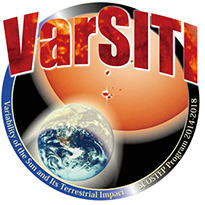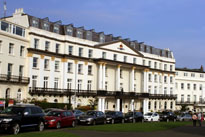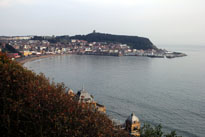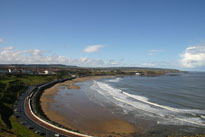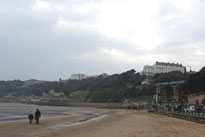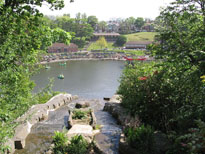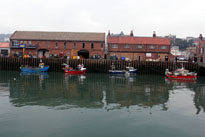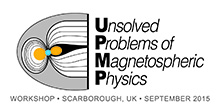
Unsolved Problems in Magnetospheric Physics Workshop
Crown Spa Hotel
Scarborough, UK
6-12th September, 2015
*Special Section of JGR*
(http://agupubs.onlinelibrary.wiley.com/agu/issue/10.1002/(ISSN)2169-9402(CAT)SpecialIssues(VI)UPMP/)
*Editor's Vox on UPMP*
(https://eos.org/editors-vox/even-magnetosphere-problems)
Workshop Topics
The workshop will focus on unresolved problems in magnetospheric physics. Example discussion topics are detailed below:
UNSOLVED PROBLEMS IN MAGNETOSPHERIC PHYSICS
- What are the plasma pathways into and through the magnetosphere?
- When, where, and why does reconnection occur? Is it steady or transient?
- Localized or extended?
- What determines the substorm onset and the substorm evolution?
- How does solar-wind/magnetosphere coupling work?
- What is the source of the 3-hr period of magnetospheric dynamics?
- What powers auroral arcs and what is the impact of aurora on the dynamics of the magnetosphere?
- How does polar-cap saturation work? How is the polar-cap potential related to dayside reconnection?
- How significant are kinetic processes in the foreshock for the solar wind-magnetosphere interaction?
- How do the nightside and the dayside of the magnetosphere communicate?
- How do the northern and southern hemispheres couple?
- What is the connection between ionospheric signatures and magnetosheath and magnetotail processes?
- Can we predict and quantify ionospheric outflow rates?
- What are the actual values of ionospheric conductivity, how does it vary, and how does it affect the magnetosphere?
- What determines whether a storm produces a radiation belt enhancement or depletion?
- How important is fine scale structure in the solar wind, in the magnetosheath, in current systems, in the ionosphere, in magnetospheric plasmas, and in magnetospheric flows?
- What controls the distribution of mass in the magnetosphere and how does the mass distribution influence the magnetosphere's properties.
FUTURE OF MAGNETOSPHERIC RESEARCH
- What are the new frontiers of reconnection research?
- What needs to be done to predict the dayside reconnection rate?
- When will we be able to predict magnetospheric activations?
- How important are scaling laws in magnetospheric physics?
- How important are magnetospheric feedback mechanisms to the dayside reconnection rate?
- Can we understand the details of a non-linear system using "linear" physics?
- Can we quantify the energy flow into and out of the magnetosphere?
- How does the magnetosphere change under unusual solar-wind conditions?
- For the radiation-belt problem: do we need better physics or better boundary conditions?
Conference Presentations
- Elizaveta Antonova - Auroral Oval Mapping and the Main Problems of Magnetospheric Dynamics
- Joe Borovsky - Do We Really Understand Solar-Wind/Magnetosphere Coupling?
- Jacob Bortnik - Some outstanding problems in radiation belt and wave physics
- Mick Denton - What is the origin of low-energy electrons in the inner magnetosphere?
- Dennis Gallagher - What Processes Influence Plasmaspheric Refilling?
- Natalia Ganushkina - Substorm-associated effects in the variations of low energy electron fluxes in the inner magnetosphere: Does the substorm’s strength matter?
- Gerhard Haerendel - Overcoming Uncertainties in the Relation between Source and Aurora
- Rod Heelis - Ionospheric Signatures of Magnetospheric Convection
- Larry Kepko - What causes auroral arcs… and why we should care?
- Mona Kessel - Things we don’t yet understand about solar driving of the radiation belts
- Craig Kletzing - Challenges in the Understanding of Auroral Acceleration Physics
- Larry Lyons - The day-night connection: Driving via meso-scale flow channels?
- Bob McPherron - What determines when and where reconnection begins
- Steve Milan - What controls the dayside reconnection rate?
- Tom Moore - How do solar wind and ionospheres interact via reconnection?
- Nikolai Ostgaard - Unanswered questions regarding solar wind - magnetosphere interaction
- Lori Sarno-Smith - Open Questions in Plasmaspheric Composition, Wave Propagation, and Plasmapause Detection
- Marina Stepanova - Turbulent transport and evolution of kappa distribution in the plasma sheet
- Michelle Thomsen - Unsolved Problems in Saturn’s Magnetosphere
- Vytenis Vasyliunas - Physical nature of near-Earth magnetotail reconnection events
- Dan Weimer - Unsolved Problems In Ionospheric Conductivity
- Dan Welling - Ionospheric Outflow and the Magnetosphere: A Poorly Understood, Non-Linear Relationship
- Lynn Wilson III - Particle acceleration through wave-particle interactions
Venue and Accommodation
The workshop will be held at the four-star Crown Spa Hotel, Scarborough, UK. The hotel hosts a comprehensive fitness suit, health spa, pool, and a range of other facilities.
We have secured a variety of reduced rate rooms at the hotel (single/double/king/twin) with room rates from £64-£127 per night. Please contact the hotel directly to make your booking.
Useful Information
- The conference icebreaker (including food and drink) is at 18:00 on Sunday evening, 6th September. The talks run from Monday morning 7th September until Saturday lunchtime on 12th September.
- The most-straightforward way to get to Scarborough is to fly into Manchester Airport (MAN) - Delta, United, and AA all fly from North America to Manchester direct, as do numerous other European and International carrier. Once at the airport, take a train directly to Scarborough. The direct train ride to Scarborough take about 3 hours and trains leave the airport roughly every hour during the daytime. Trains back to the airport from Manchester also are roughly ever hour during the daytime (http://www.nationalrail.co.uk/).
- Sights in the area include the Medieval City of York, the North York Moors, and also the fishing villages of Staithes, Robin-Hood's Bay, and the town of Whitby, if you want to add a day to your trip before or after the conference. See here for local tourism information.
Local Transport
Scarborough can be reached via road, or train. For international attendees it is easiest and quickest to fly into Manchester International Airport (MAN), which has direct flights to many hubs around the world. There is a direct (and scenic) train route to Scarborough from inside the Manchester Airport Terminal (~3 hour journey). Tickets can be booked in advance (easiest) or bought on the day. A ticket for a two-way trip is ~£68. National Rail Enquiries (http://www.nationalrail.co.uk/) can provide advice, details, and tickets. An Anytime Return ticket (~£80) provides the most flexibility regarding travel times.
About Scarborough
"Are you going to Scarborough Fair...?"
Scarborough is a beautiful seaside town with a lot of history. An 11th century medieval castle, is situated on the site of previous Roman fortifications, which rest on an even earlier Bronze Age settlement. The castle played a part in the English Civil War, twice coming under seige.
The town still has an active working harbour, and Scarborough was once the world capital for big-game tunny (tuna) fishing in the 1930s.
Several world-records for the largest tuna landed were set off
the coast of the town. Although leisure and commercial fishing
remains popular, over-fishing resulted in tuna being wiped out.
Maritime history remains strong in Scarborough, which still boasts the smallest manned navy in the world (!!!).
Cliffs around Scarborough yield a wealth of Jurassic era fossils and the region is unofficially dubbed "the Jurassic coast".
The town is split into two sections by the headland, topped by Scarborough Castle, which separates North Bay from South Bay.
More information about the region can be found here.
Around Scarborough
Around Scarborough Map
Attractions
Restaurants
Restaurant Map
Pubs
Pub Map

